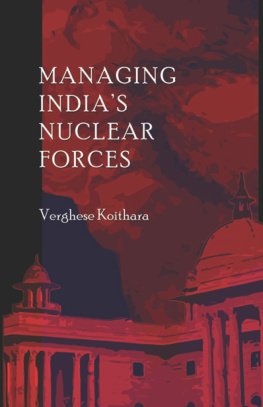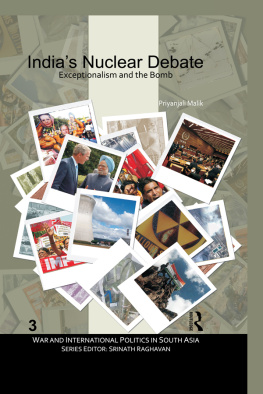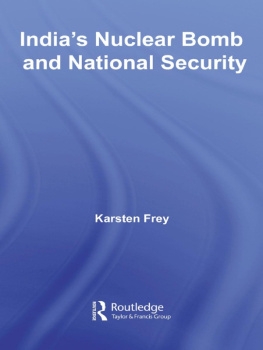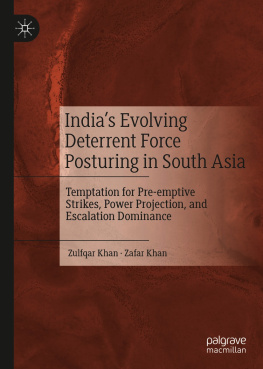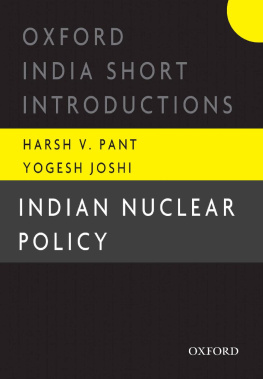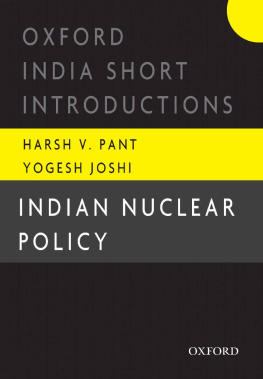Verghese Koithara - Managing Indias Nuclear Forces
Here you can read online Verghese Koithara - Managing Indias Nuclear Forces full text of the book (entire story) in english for free. Download pdf and epub, get meaning, cover and reviews about this ebook. year: 2012, publisher: Brookings Institution Press, genre: Politics. Description of the work, (preface) as well as reviews are available. Best literature library LitArk.com created for fans of good reading and offers a wide selection of genres:
Romance novel
Science fiction
Adventure
Detective
Science
History
Home and family
Prose
Art
Politics
Computer
Non-fiction
Religion
Business
Children
Humor
Choose a favorite category and find really read worthwhile books. Enjoy immersion in the world of imagination, feel the emotions of the characters or learn something new for yourself, make an fascinating discovery.
- Book:Managing Indias Nuclear Forces
- Author:
- Publisher:Brookings Institution Press
- Genre:
- Year:2012
- Rating:3 / 5
- Favourites:Add to favourites
- Your mark:
- 60
- 1
- 2
- 3
- 4
- 5
Managing Indias Nuclear Forces: summary, description and annotation
We offer to read an annotation, description, summary or preface (depends on what the author of the book "Managing Indias Nuclear Forces" wrote himself). If you haven't found the necessary information about the book — write in the comments, we will try to find it.
Managing Indias Nuclear Forces — read online for free the complete book (whole text) full work
Below is the text of the book, divided by pages. System saving the place of the last page read, allows you to conveniently read the book "Managing Indias Nuclear Forces" online for free, without having to search again every time where you left off. Put a bookmark, and you can go to the page where you finished reading at any time.
Font size:
Interval:
Bookmark:
Institute for Peace and Conflict Studies, New Delhi
Policy Architects International, Washington, D.C.
Nuclear Forces
Washington, D.C.
The Brookings Institution is a private nonprofit organization devoted to research, education, and publication on important issues of domestic and foreign policy. Its principal purpose is to bring the highest quality independent research and analysis to bear on current and emerging policy problems. Interpretations or conclusions in Brookings publications should be understood to be solely those of the authors.
Verghese Koithara
Brookings Institution Press, 1775 Massachusetts Avenue, N.W.
Washington, D.C. 20036
Telephone: 1-800/537-5487 or 410/516-6956
E-mail:
www.brookings.edu
Sri Lanka, or the Maldives.
15-17 Tolstoy Marg, Connaught Place, New Delhi 110 001
ISBN: 978-0-8157-2266-3 (cloth : alk. paper)
Harrisonburg, Virginia
| ABM | Anti-Ballistic Missile |
| ACSA | Acquisition and Cross Service Agreement |
| AEC | Atomic Energy Commission |
| AERB | Atomic Energy Regulatory Board |
| ASW | Anti-Submarine Warfare |
| ASWAC | Airborne Surveillance Warning and Control system |
| ATGM | Anti-Tank Guided Missile |
| ATV | Advanced Technology Vessel |
| AWACS | Airborne Warning and Control System |
| BARC | Bhabha Atomic Research Centre |
| BECA | Basic Exchange and Co-operation Agreement |
| BJP | Bharatiya Janata Party |
| BMD | Ballistic Missile Defence |
| C&C | command and control |
| C-in-C | Commander in Chief |
| CAS | Chief of Air Staff |
| CBM | Confidence Building Measure |
| CCPA | Cabinet Committee on Political Affairs |
| CCS | Cabinet Committee on Security |
| CDE | Committee on Defence Expenditure |
| CDS | Chief of Defence Staff |
| CEP | Circular Error Probable |
| CGS | Chief of General Staff |
| CISC | Chief of Integrated Defence Staff to the Chairman, Chiefs of Staff Committee |
| CISMOA | Communications and Information Security Memorandum of Agreement |
| CJCS | Chairman Joint Chiefs of Staff |
| CMC | Cuban Missile Crisis |
| COAS | Chief of Army Staff |
| COMINT | Communications Intelligence |
| COSC | Chiefs of Staff Committee |
| CTBT | Comprehensive Test Ban Treaty |
| DAE | Department of Atomic Energy |
| DCC | Defence Committee of the Cabinet |
| DDF | Department of Defence Finance |
| DDP | Department of Defence Production |
| DMC | Defence Minister's Committee |
| DND | Draft Nuclear Doctrine |
| DOD | Department of Defence |
| DOE | Department of Energy |
| DOS | Department of Space |
| DPS | Defence Planning Staff |
| DRD | Department of Defence R&D |
| DRDO | Defence Research & Development Organisation |
| EADS | European Aeronautic Defence and Space company |
| ECC | Emergency Committee of the Cabinet |
| EHF |
Font size:
Interval:
Bookmark:
Similar books «Managing Indias Nuclear Forces»
Look at similar books to Managing Indias Nuclear Forces. We have selected literature similar in name and meaning in the hope of providing readers with more options to find new, interesting, not yet read works.
Discussion, reviews of the book Managing Indias Nuclear Forces and just readers' own opinions. Leave your comments, write what you think about the work, its meaning or the main characters. Specify what exactly you liked and what you didn't like, and why you think so.

